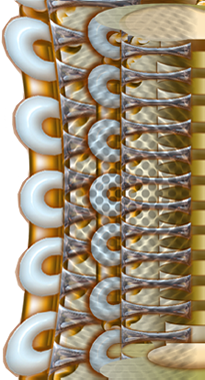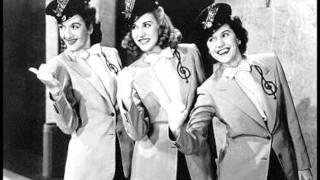| You are not logged in. | login to customize your own personal play list |
“Don’t Fence Me In” by Bing Crosby & The Andrews Sisters |
| United States Federal Trade Commission forbids anyone under 13 from viewing these music videos! |
| You are not logged in. | login to customize your own personal play list |
“Don’t Fence Me In” by Bing Crosby & The Andrews Sisters |
| United States Federal Trade Commission forbids anyone under 13 from viewing these music videos! |
 |
 |
 |
 |
You need Flash player 8+ and JavaScript enabled to view this video.
|
 |
 |
   |
 |

song info “Don’t Fence Me In” by Bing Crosby & The Andrews Sisters is a Western song. Song Title: Don’t Fence Me InArtist: Bing Crosby & The Andrews Sisters Genre: classic pop, Western Composer: Copyright © 1934 music: Cole Porter lyrics: Robert Fletcher and Cole Porter Vocals: Bing Crosby & The Andrews Sisters Date:: 1944 Number of listens: 8850 Current rank: 2413 (updated weekly) Highest rank: 2393 (play the video all the way through to register a vote for this song) Translations courtesy of Apple and Google. |
||
Summary quotation from Wikipedia:
“Don’t Fence Me In” is a popular American song written in 1934, with music by Cole Porter and lyrics by Robert Fletcher and Cole Porter.
Origins
Originally written in 1934 for Adios, Argentina, an unproduced 20th Century Fox film musical, “Don’t Fence Me In” was based on text by a poet and engineer with the Department of Highways in Helena, Montana, Robert (Bob) Fletcher. Cole Porter, who had been asked to write a cowboy song for the 20th Century Fox musical, bought the poem from Fletcher for $250. Porter reworked Fletcher’s poem, and when the song was first published, Porter was credited with sole authorship. Porter had wanted to give Fletcher co-authorship credit, but his publishers did not allow that. After the song became popular, however, Fletcher hired attorneys who negotiated his being given co-authorship credit in subsequent publications. Although it was one of the most popular songs of its time, Porter claimed it was his least favorite of his own compositions.
In 1934, Robert Fletcher sent Porter his song, entitled “Don’t Fence Me In,” which he had written at the suggestion of film producer Lou Brock, with the film Adios, Argentina in mind. Porter bought the rights, with the agreement that he would use the title, could re-work the lyrics if he chose, and could write his own music.
Porter’s revision of the song retained quite a few portions of Fletcher’s lyrics, such as “Give me land, lots of land”, “… breeze … cottonwood trees”, “turn me loose, let me straddle my old saddle,” “mountains rise … western skies”, “cayuse”, “where the west commences,” and “… hobbles … can’t stand fences,” but in some places modified to give them “the smart Porter touch”. Porter substituted some whole lines, rearranged lyric phrases, added two verses, and composed his own music for it. (Porter’s exact verse about Wildcat Kelly was not included in any of the hit recordings of the song nor used in either of the movies in which the song was used. Roy Rogers did refer to “Wildcat Willy” when he performed it in 1944’s Hollywood Canteen).
Cover versions
Ten years later, in 1944, Warner Bros. resurrected “Don’t Fence Me In” for Roy Rogers to sing in the movie Hollywood Canteen. Many people heard the song for the first time when Kate Smith introduced it on her radio broadcast of October 8, 1944.
“Don’t Fence Me In” was also recorded by Bing Crosby and The Andrews Sisters in 1944. Crosby entered the studio on July 25, 1944, without having seen or heard the song. Within 30 minutes, he and the Andrews Sisters had completed the recording, which sold more than a million copies and topped the Billboard charts for eight weeks in 1944–45.
—from Wikipedia (the Wikipedia:Text of Creative Commons Attribution-ShareAlike 3.0 Unported License applies to Wikipedia’s block of text and possible accompanying picture, along with any alterations, transformations, and/or building upon Wikipedia’s original text that ThisSideofSanity.com applied to this block of text)
The Americans with Disabilities Act (ADA) and U.S. Government Section 508 of the Rehabilitation Act of 1973 require that web sites provide transcripts of audio for the deaf.
We will be adding lyrics to all songs as fast as we can. Please be patient.
Allison: This is Bing Crosby & The Andrews Sisters’s best song.
To submit a comment, use the form below:
Please use the form (with the delay for a human to inspect it) because this website is attacked by more than 20 spam attempts per minute. The only way to keep you safe from the spam is by having human review.
 |
  |
|
If you spot an error in fact, grammar, syntax, or spelling, or a broken link, or have additional information, commentary, or constructive criticism, please contact us.
Copyright © 2014 Milo. All rights reserved. Todos Derechos Reservados. The copyrights on all source code and the data base belong to Milo and are used on this web site by permission.
The source code is at OSdata.com, released under Apache License 2.0.
Copyright 2012, 2013, 2014 Milo
Licensed under the Apache License, Version 2.0 (the “License”); you may not use this file except in compliance with the License. You may obtain a copy of the License at:
http://www.apache.org/licenses/LICENSE-2.0
Unless required by applicable law or agreed to in writing, software distributed under the License is distributed on an “AS IS” BASIS, WITHOUT WARRANTIES OR CONDITIONS OF ANY KIND, either express or implied. See the License for the specific language governing permissions and limitations under the License.
Enjoy the This Side of Sanity website Twitter feed.
Enjoy the This Side of Sanity Twitter feed.

|
player artwork by michaelm